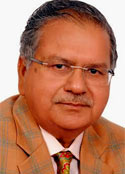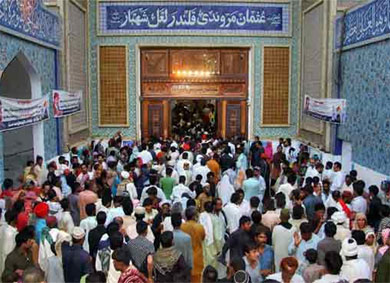
By Sultan Shahin,
Founding Editor, New Age Islam
21 February 2017
The massacre of over a
hundred devotees at Sufi shrine of Jhule Lal Shahbaz Qalandar at Sehwan in
Sindh, Pakistan is neither the first such incident nor is it going to be the
last. There are condemnations galore from Muslims of all hues including
Salafi-Wahhabis. The general secretary of Indian Jamiat Ahl-e-Hadith, Maulana
Asghar Ali Imam Mehdi Salafi, for instance, has condemned the incident in the
strongest terms.
However, the problem
is that contrary to all evidence Salafi-Wahhabis refuse to accept that it is
their own theology that has created an environment in which such regular
massacres have become possible. Indeed, the entire establishment and expansion
of Wahhabism as a force to reckon with has been based on mass murders and
destruction of shrines from early 19th century onwards.
Wahhabi vandalism
started in 1802 when an army of 12,000 Najdi Salafi warriors called Ikhwan
attacked Shia holy sites in the city of Karbala, slaying 4,000 of that city's
inhabitants. In 1803 they attacked Makkah but the Makkans, having known the
fate of Karbala, surrendered to Saudi Wahhabi rule. The Wahhabi Ikhwan then
smashed Sufi shrines and the graves of even the closest companions of the
Prophet. In Madina, they not only destroyed common grave-sites, but even
attacked the tomb of Prophet Mohammed (pbuh).

Photo: Geo News
Since then the history of Islam
has been a history of massacres of non-Wahhabi Muslims and destruction of holy
sites. Presently the banner of forcible Wahhabi expansion is taken up by
al-Qaeda, ISIS, Taliban, Lashkar-e-Taiba, Lashkar-e-Jhangawi, Al-Shabab, Boko
Haram, etc.
Muhammad ibn Abdul
Wahhab (1703–1792), the founder of Saudi Arabia’s Wahhabi-Salafi creed declared
all rationalist and mystic Muslims as mushrik or polytheists and thus “wajibul
qatl” (deserving death). In a long discourse in Kashaful Shubhat, he
explained why all Muslims despite their claim to believe in one God are
polytheists whose lives and property are halal (permitted) for Wahhabi Muslims.
He concluded his discourse: “… You now understand that these people's
(non-Wahhabi Muslims’) accepting tauheed (oneness of God) does not make
them Muslim; the fact that they expect intercession from others than God (Sufi
saints) makes them liable to be killed and their property to be looted."
----- Kashaful Shubhat, p.9, Maktaba al-salafia bil Madina Munawwara, 1969 CE)
Another Abdul Wahhab
quote necessary to understand the current conflict is the following: “Even if
the Muslims abstain from shirk (polytheism) and are muwahhid (believer
in oneness of God), their faith cannot be perfect unless they have enmity and
hatred in their action and speech against non-Muslims (which for him includes
all non-Wahhabi Muslims). (Majmua Al-Rasael Wal-Masael Al-Najdiah 4/291).
The problem with
Indian Salafi ulema like Maulana Imam Mehdi Salafi is that while they
condemn specific terrorist incidents, they do not denounce the Wahhabi-Salafi
ideology that they actually follow. This is a self-contradictory stance. You
denounce terrorism and follow the ideology from which it emanates. From the
time of the Mohammad bin Abdul Wahhab - Muhammad bin Saud pact in 1744,
Salafi-Wahhabis have been following this murderous ideology which calls all
non-Wahhabi Muslims mushrik (polytheist) and Wajibul Qatl
(deserving death).
If Ahl-e-Hadith and
other Salafi Muslims are sincere in condemning sectarian terrorism they need to
also denounce and renounce the Wahhabi-Salafi ideology that calls for murder,
destruction and looting of property. They only need to do what Abdul Wahhab’s
father and brother did. In fact, his brother Shaykh Sulayman ibn 'Abd al-Wahhab
wrote a book refuting his arguments. Abdul Wahhab was able to propagate his
ideas freely only when his father, a Qazi of the region, passed away.
Although Sufi-oriented
Muslims, rationalists, Shias, etc have been a victim of Salafi-Wahhabi
terrorism, it would be wrong to conclude that extremism is limited to Wahhabis.
The recent murder of Pakistani Punjab’s Governor Salman Taseer and the
deification of his Brailvi murderer by millions of Muslims shows that extremism
is widespread across all sects of Islam. All Muslims who sincerely denounce
terrorism need to introspect and brainstorm together how to weed out ideologies
within Islam that lead to such massacres of Muslims and non-Muslims alike.
We also need to expose
the hypocrites within Islam. There are people who denounce terrorism in public
and teach in their madrasas that early peaceful and pluralistic verses of Quran
have been abrogated by the later war-time verses asking us to kill the kafir
and mushrik. Of course, war-time verses had come in a certain context
which no longer exists and so these instructions can no longer apply to us. The
first task before us is to come out of denial, accept that our theology and
jurisprudence have been corrupted and then start thinking of changing our
mindset, so that we can live as peaceful citizens of this inter-connected
twenty-first century world.
----
Sultan Shahin is
the founding editor of a Delhi-based progressive Islamic website
NewAgeIslam.com.
This article
appeared first in Mail Today on 21 February 2017.




 Moderate Islamist here
Moderate Islamist here


0 comments:
Post a Comment